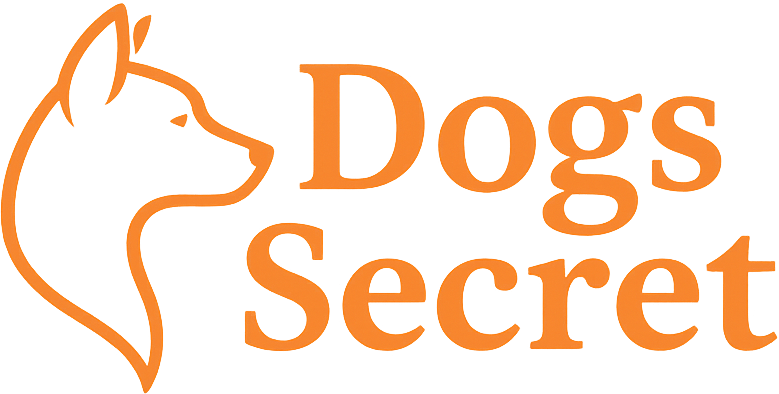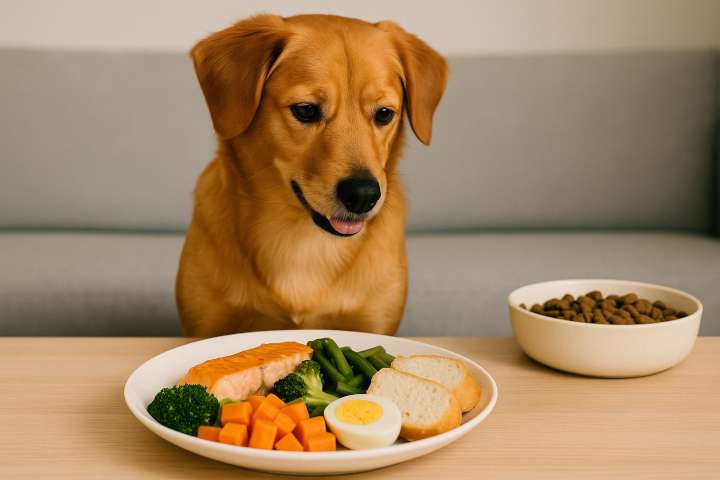What human foods are safe for dogs is a question every pet owner should ask before sharing a snack. It’s hard to resist those puppy eyes at the dinner table—but before you share a bite, it’s important to know which human foods are safe for dogs and which ones could cause serious harm.
Some “people foods” offer nutritional benefits to dogs, while others can lead to digestive issues, poisoning, or even organ failure. In this guide, we’ll list the safest options, their benefits, and how to serve them responsibly.
Why Feed Human Foods at All?
When used properly, certain human foods can:
- Add nutritional variety to your dog’s diet
- Be used as healthy treats or training rewards
- Help with hydration, digestion, or inflammation
- Support dogs with allergies or special needs
But always introduce new foods slowly and in moderation, and consult your vet for dogs with medical conditions.
Safe Human Foods for Dogs (With Benefits)
Lean Meats (Cooked Only)
- Chicken, turkey, lean beef, pork
- Plain, cooked (no seasoning, sauces, or bones)
Benefits: High-quality protein for muscles, immune system, and energy
Salmon and Sardines
- Cooked only; boneless
- Avoid raw fish due to parasites
Benefits: Omega-3s for coat health, brain function, and inflammation
Eggs (Cooked)
- Scrambled or hard-boiled without oil or salt
Benefits: Rich in protein, amino acids, and biotin
Carrots
- Raw or cooked; cut into bite-sized pieces
Benefits: Low-calorie, crunchy treat that supports dental health and eyesight
Blueberries
- Fresh or frozen
Benefits: Antioxidants, fiber, and vitamin C—great for immune health
Bananas
- Peeled and sliced
Benefits: Natural source of potassium and vitamins; easy on the stomach
Apples (No Seeds)
- Sliced, with core and seeds removed
Benefits: Fiber and vitamin A; promotes fresh breath
Spinach & Kale
- Lightly steamed or chopped raw
Benefits: Loaded with antioxidants, iron, and vitamins A, C, and K
Sweet Potatoes
- Cooked and plain; no butter, salt, or seasoning
Benefits: Fiber, beta-carotene, and slow-digesting energy
Plain Rice or Oatmeal
- White rice or cooked oats; ideal for upset stomachs
Benefits: Soothes digestion and provides easy-to-absorb carbs
Peanut Butter (No Xylitol)
- In small amounts, unsalted and sugar-free
Benefits: Tasty source of healthy fats and protein; great for training
Human Foods Safe in Moderation
- Cheese – Low-lactose types like mozzarella; can cause gas or diarrhea in sensitive dogs
- Yogurt – Plain, unsweetened (no xylitol); probiotic benefits
- Watermelon – Seedless, rind removed
- Pumpkin – Plain, canned or cooked (not pumpkin pie filling)
- Green beans – Steamed or raw
- Cucumbers – Hydrating and crunchy
Dangerous Human Foods to Avoid
Food | Why It’s Dangerous |
|---|---|
Chocolate | Contains theobromine – toxic to dogs |
Grapes & Raisins | Can cause kidney failure |
Onions & Garlic | Damage red blood cells – toxic even in small amounts |
Xylitol (sweetener) | Found in gum, peanut butter – can cause liver failure |
Avocado | Contains persin – can cause vomiting and diarrhea |
Alcohol | Even small amounts are toxic |
Caffeine | Can lead to seizures or heart issues |
Raw Dough | Expands in stomach; causes bloating and alcohol buildup |
Cooked Bones | Can splinter and damage internal organs |
Macadamia Nuts | Highly toxic – cause tremors, vomiting, and weakness |
Tips for Feeding Human Foods Safely
- Serve plain and unseasoned (no salt, oil, butter, or sauces)
- Cut into bite-sized pieces to avoid choking
- Introduce one new food at a time
- Monitor for allergic reactions or digestive upset
- Use as treats, not meal replacements
- Always check ingredients in store-bought foods for hidden xylitol or garlic
Conclusion
Final Thoughts on What Human Foods Are Safe for Dogs
Many human foods can be healthy, safe additions to your dog’s diet—if you know what to serve and how to serve it. Stick to vet-approved options, avoid known toxins, and always feed in moderation.
Want a printable “Safe & Unsafe Foods for Dogs” chart for your kitchen? Visit our Canine Nutrition Center for free downloads and meal-planning tools.

